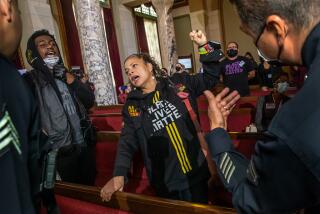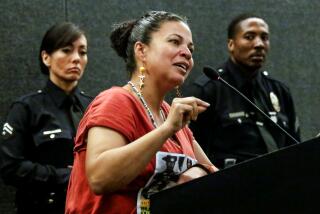A disabled African American Sterling tenant speaks out from the grave
Kandynce Jones has been dead going on 11 years now.
But she has something to tell us about about Donald and Shelly Sterling’s history of being sued for racial discrimination, and something to impart about whether the accusations should have any bearing on the scandal now engulfing Los Angeles and the NBA.
Because Kandynce is not here, it’s left to her daughter, Ebony Jones, to make sure her mother’s terrible last months are not forgotten.
“Most daughters love their mothers,” said Ebony Jones, 39. “Few are so inspired by their mother’s fight for justice that they feel compelled to carry it on, even after their mother’s death. I am one of those lucky few.”
Ebony Jones and her attorney, Gloria Allred, have offered to meet with the NBA to discuss her mother’s experience as a Sterling tenant. “We believe that the NBA should consider his callous racist conduct in the case of Kandynce Jones,” Allred wrote to NBA Commissioner Adam Silver on May 8. So far, Allred said Tuesday, she has not heard back.
According to Ebony and court documents, Kandynce Jones had lived peacefully in Apt. 121 at 445 S. Ardmore Ave. in Los Angeles for eight years before the Sterlings purchased the building and became her landlords from hell.
A retired hairdresser, Kandynce was legally blind, suffered from sickle cell anemia, high blood pressure and was paralyzed on her right side after a surgery gone wrong, Ebony told journalists Monday in Allred’s conference room. Allred put a supportive arm around Jones a few times when she choked up.
“Because she was blind and couldn’t really get out on account of her paralysis, the apartment was more than a home,” Jones said. “It was her sanctuary.”
Soon after the Sterlings took over, Jones, said, her mother’s sanctuary became “an uninhabitable cage.”
According to a federal housing discrimination complaint filed in February 2003 by the Housing Rights Center on behalf of Kandynce Jones and 19 other Sterling tenants, Donald and Shelly Sterling did not want black or Latino tenants in their apartment houses and engaged in a systematic campaign to get them out so that Koreans, considered better tenants by Sterling, could move in. The Sterlings, of course, denied the claims.
What Ebony Jones described Monday (and what claims in court documents allege) was a war of attrition waged against an elderly, infirm woman ill equipped to fight back.
“First the stove [failed],” said Ebony Jones. “Next the icebox. The dishwasher stopped working. The toilet broke. Still Mr. Sterling did nothing. My mother and I were literally forced to dispose of her own feces by hand. It seemed to my mother that Mr. Sterling tried to make the conditions in her apartment so disgusting that she would break down and move. When the elevator in front of my mother’s apartment also went out, Mr. Sterling still did nothing, forcing my half-paralyzed mother to climb stairs at her own risk.”
After construction work on the building caused a flood in Kandynce Jones’ apartment, said Ebony, she became “distraught and disoriented, standing in several inches of water as familiar objects were floating by.” The flood, said Jones, caused fungus and mold.
Kandynce Jones asked to be reimbursed for her ruined things. After that, according to ESPN the Magazine reporter Peter Keating, who obtained depositions in the case for an extraordinary 2009 Sterling profile, apartment manager Sumner Davenport testified that Sterling told her, “Just evict the bitch.”
Kandynce Jones died on July 21, 2003, while the lawsuit was pending.
Her daughter told me on Monday that she did not believe that Donald Sterling’s actions caused her mother’s death. But the Housing Rights Center lawsuit, amended after Kandynce Jones died to add Ebony as a plaintiff in her stead, placed blame squarely on him: “Mrs. Jones,” it said, “suffered a stroke caused by Defendants’ housing practices. On July 21, 2003, Ms. Jones passed away as a result of that stroke.” She was 67.
The Sterlings, who denied any wrongdoing, eventually settled the case. Though the terms are confidential, we do know they were compelled to pay $4.9 million in plaintiffs’ attorneys’ fees alone. Court documents do not say how much the actual settlement was but indicate that it was less than the attorneys’ fees.
The federal district court judge overseeing the case believed the plaintiffs had a pretty strong case on some of their claims.
For instance, the Sterlings changed the names of several apartment buildings to include the words “Korean” or “Asian.” Latino and black tenants claimed this was a message that they were not welcome, and a federal judge agreed.
“Los Angeles is … a remarkably polyglot city that, sadly, has been plagued by ethnic divisions for decades,” wrote United States District Judge Howard Matz in a ruling in the case on July 31, 2003. “Many residents would understandably regard the decision to place the word ‘Korean’ in the name of a building in a racially diverse neighborhood as a coded message: ‘Koreans and Korean-Americans are welcome and preferred; others are not.’”
The fight over the Sterlings’ ownership of the Los Angeles Clippers is moving into a new phase.
This week, Donald Sterling made a fool of himself on national television, insulting Magic Johnson and making racist assertions, all the while insisting he is not a racist.
Shelly Sterling is conducting her own PR blitz, with a legal team and damage control experts helping her press the case that she should not be punished by the NBA for her husband’s outrageous remarks.
Her people emphasize that Shelly Sterling never admitted to any of the claims in the two federal housing discrimination lawsuits that she and her husband settled for millions of dollars. They want everyone to know that defendants often settle cases to avoid costly litigation. So, yeah, Mrs. Sterling, if that’s your moral argument that you deserve to own the Clippers, good luck with that.
As the NBA commissioner, the league’s Board of Governors and NBA players (3/4 of whom are African American and have a huge stake in the outcome of this debacle) think about what should happen next, I’d make one simple request of them:
Don’t forget about Kandynce Jones. She fought back. You should too.
More to Read
Sign up for Essential California
The most important California stories and recommendations in your inbox every morning.
You may occasionally receive promotional content from the Los Angeles Times.











